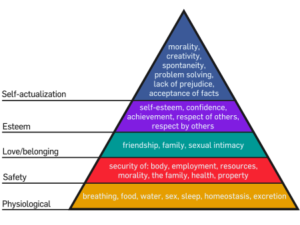Understanding Behavioral Individuality Resources
Developing Social/Emotional Skills
Center on the Social and Emotional Foundations for Early Learning
Temperament:
Temperament-Based Intervention: Reexamining Goodness of Fit
Resilience:
I Am Safe and Secure: Promoting Resilience in Young Children
Building Resilience in Young Children
Zero to Three: Building Resilience
Infant and Toddler Resilience: Knowledge, Predictions, Policy and Practice
Maslow’s Hierarchy of Needs Fully Explained: https://www.simplypsychology.org/maslow.html
Self-Regulation: The Cornerstone of Early Childhood Development
Developing Young Children’s Self-Regulation Through Everyday Experiences
The Role of Co-Regulating in Building Self-Regulation Skills
Developing School Readiness: 0-12 Months
Developing School Readiness: 12-24 Months
Developing School Readiness: 24-36 Months
Encouraging Infants and Toddlers’ Self-Confidence and Self-Control
As a caregiver for infants and toddlers, it is important for you to continuously promote and encourage self-confidence and self-control in the children you care for. Your interactions with and actions around the children will influence how they feel about those who care for them and the world they live in. These feelings then directly influence how they feel about themselves. Your behaviors and communications also teach infants and toddlers to develop self-control. This ability gradually grows as they get older, but also requires guidance and modeling from caregivers.
The following links will take you to Zero to Three’s website where they provide specific information about promoting self-confidence and self-control in infants and toddlers. These links offer excellent and simple suggestions to help caregivers fulfill this important role:
Infants (0-12 months):
Self-Confidence: http://main.zerotothree.org/site/PageServer?pagename=ter_par_012_selfconfidence
Self-Control:
http://main.zerotothree.org/site/PageServer?pagename=ter_par_012_selfcontrol
Toddlers (12-24 months):
Self-Confidence: http://main.zerotothree.org/site/PageServer?pagename=ter_par_1224_selfconfidence
Self-Control: http://main.zerotothree.org/site/PageServer?pagename=ter_par_1224_selfcontrol
Toddlers (24-36 months):
Self-Confidence: http://main.zerotothree.org/site/PageServer?pagename=ter_par_2436_selfconfidence
Self-Control:
http://main.zerotothree.org/site/PageServer?pagename=ter_par_2436_selfcontrol
Additional Readings
Branscomb, K., & Goble, C. (2008). Infants and toddlers in group care: Feeding practices that foster emotional health. Young Children, November 2008, 28-33.
Crosser, S. (2008). Do you know how I feel? Empathy and the young child. Early Childhood News. Retrieved from
http://www.earlychildhoodnews.com/earlychildhood/article_view.aspx?ArticleID=242
Gillespie, L., & Hunter, A. (2008). Emotional flooding: Using empathy to help babies manage strong emotions. Beyond the Journal, September 2008, 1-2.
Gillespie, L., & Seibel, N. (2006). Self-regulation: The cornerstone of early childhood development. Beyond the Journal, July 2006, 1-6.
Gonzalez-Mena, J. (2007). What do to for a fussy baby: A problem solving approach. Beyond the Journal, September 2007, 1-6.
Additional Websites
Maslow’s Hierarchy of Needs Fully Explained: https://www.simplypsychology.org/maslow.html
Temperament and Personality Examples of Thomas and Chess’s Dimensions: http://psych.colorado.edu/~colunga/P4684/temperament.pdf
Tips and Tools for Promoting Social/Emotional Development in Infants and Toddlers: http://www.zerotothree.org/child-development/social-emotional-development/tips-and-tools-promoting-social-emotional-development.html
Zero to Three: Development of Social-Emotional Skills:
- Information is divided up into three age groups: Birth-12 months, 12-24 months and 24-36 months
Zero to Three: Promoting Social-Emotional Development:
http://www.zerotothree.org/child-development/social-emotional-development/
The Visual Cliff Experiment (Social Referencing): http://www.youtube.com/watch?v=p6cqNhHrMJA
Kids Mental Health Information Portal – Behavioral and Emotional Disorders: http://www.kidsmentalhealth.org/childrens-behavioral-and-emotional-disorders/
Temperament.com – Understanding Behavioral Individuality: https://www.b-di.com/#
